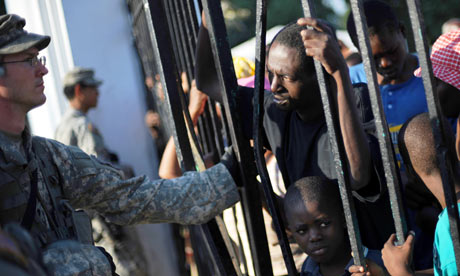The reconstruction of Haiti must be fair and transparent, or the result will be another version of the same unjust society

Maintaining public order? US soldiers at a food distribution point in Port-au-Prince, Haiti. Photograph: Roberto Schmidt/AFP/Getty Images
As the international press leaves Port-au-Prince, the images may disappear from our screens. But nothing has been resolved for thepeople of Haiti. Tens of thousands have left the city for the small provincial towns, whose populations have doubled in a matter of days. These refugees will depend on the goodwill of their relatives and neighbours, just as those who are left in the capital have had to rely on their own communal solidarity. The promised aid is arriving slowly, not simply because of bureaucracy and corruption, nor due to the material difficulties of distribution alone.
News reports still insist on the question of security, as if the pressing problem were the need to maintain public order. This argument has been used to justify placing Haitian society under the direct control of the US military – whose contingent is about to double to 20,000 – very few of whom have skills in distributing aid and assistance. The assumption of control over the airport and the naval blockade around the island's coasts are, by any definition, acts of occupation.
Haitians will recognise the similarity to the arrival of the Marines in 1915(their presence also justified in terms of maintaining public order), or to the presence of US and UN troops under Brazilian command after 2006, whose role proved to be the repression of public protest in the name of a spurious peace. If the purpose of US occupation of Haiti (and Cuba, Puerto Rico and Nicaragua) in the early 20th century was to exercise control over its "backyard", there is powerful evidence to suggest that its reasons for being there at the beginning of the 21st century are not dissimilar.
The coup in Honduras, the recent agreement on extending military bases in Colombia and now Haiti recall Obama's concern, expressed during the election campaign, that "we are losing Latin America". It also interlocks very conveniently with US economic interests in the region and in Haiti in particular. Food and water may be scarce, but some of the factories in the so-called export processing zones, where Haitians labour in sweatshop conditions, have managed to get their machines working again. Yet there is still no electricity in the areas where people are surviving in makeshift camps or under plastic sheeting in the streets.
More sinister still, a committee of creditors is already meeting to consider the "reconstruction" of Haiti. The very word strikes a chill, given its recent use in Iraq and the consequences of the "reconstruction" of New Orleans, which abandoned the poor black population who were the victims of Hurricane Katrina in favour of expanding tourist developments. US investment in luxury resorts in northern Haiti have the same model in mind. And when Ban Ki-Moon and Bill Clinton spoke in Haiti at a press conference in April 2009, their joint recommendation was the expansion of the export zones, reinforcing Haiti's role as a provider of cheap labour for the US clothing market. Is this the reconstruction that Haiti's creditors have in mind – completing the devastation inflicted on its people on 12 January?
Why have obstacles been placed in the way of aid offered by Venezuela? Why have offers of help from the surrounding Caribbean nations through Caricom been ignored? It seems very clear that the US government is controlling Haiti to ensure that its own interests are paramount in the rebuilding process. There is an alternative to channelling funds via agencies under direct or indirect US control. The role of NGOs (which controlled 80% of the funds reaching the country before the earthquake) in Haiti has been very uneven and opaque.
If a new Haiti is to emerge, it must be more democratic, transparent and organised for the benefit of its majorities. That will be shaped now, even before the rubble is removed. The grassroots organisations that have sustained Haiti's poor both before and since the disaster of 12 January must play a key role in determining how and where resources are allocated, and the use of the funds that millions of ordinary people have given to emergency collections must be transparent. Governments have been less generous, given the scale of the damage. It would be a double tragedy for Haiti if what is rebuilt is simply another version of the same unequal and unjust society that fell to pieces on that January day.


No comments:
Post a Comment